Discover the health benefits of Organic Moringa Powder, the ultimate green superfood. Boost your immunity, energy, and overall well-being with our nutrient-rich, organic Moringa Powder. Perfect for a balanced lifestyle.
Introduction
In today’s world, where balance is key but often hard to achieve, organic moringa powder emerges as a beacon of wellness and vitality. This green superfood, derived from the leaves of the Moringa Oleifera tree, is not just a dietary supplement; it’s a lifestyle enhancer promising a plethora of health benefits. Let’s delve into the world of organic moringa powder and uncover how it can be the ultimate green boost for life’s balance.
Table of Contents
What is Moringa?
Historical Background
Moringa Oleifera, often hailed as the “Miracle Tree,” has been used for centuries in various cultures for its medicinal properties and health benefits. Originating from the Himalayan foothills, it has now found its way into the hearts and diets of health-conscious individuals worldwide.
Nutritional Profile
Packed with vitamins, minerals, and amino acids, moringa powder is a nutritional powerhouse. It contains vitamin A, C, E, calcium, potassium, and protein, making it more nutritious than many commonly known fruits and vegetables.
The Health Benefits of Organic Moringa Powder
Boosts Immunity
The high antioxidant content in moringa powder is crucial for strengthening the immune system. Antioxidants such as vitamin C, beta-carotene, quercetin, and chlorogenic acid help in neutralizing harmful free radicals in the body, reducing oxidative stress and preventing cellular damage. A strong immune system is your first line of defense against infections and diseases, making moringa an essential dietary supplement.
Enhances Energy Levels
Organic Moringa powder is rich in vitamins and minerals that contribute to energy metabolism in the body. Unlike caffeine, which provides a temporary energy spike followed by a crash, moringa sustains energy levels thanks to its high iron and magnesium content. These nutrients play a vital role in preventing fatigue and enhancing overall energy levels, making it a perfect addition to the diet of those leading an active lifestyle.
Supports Weight Management
Integrating moringa powder into your diet can also aid in weight management. The powder is high in fiber, which promotes a feeling of fullness, helping to curb appetite and reduce snack cravings. Moreover, moringa has been found to have thermogenic properties, boosting metabolism and enhancing the body’s ability to burn fat.
Improves Skin Health
The benefits of moringa extend beyond internal health, offering remarkable advantages for the skin. Its anti-inflammatory and antiseptic properties help in treating and preventing acne breakouts, while the high antioxidant content protects the skin from premature aging, promoting a youthful glow. Regular consumption of moringa powder can lead to healthier, more radiant skin.
Promotes Heart Health
Moringa powder supports heart health in several ways. It contains compounds that have been shown to lower blood pressure, reduce cholesterol levels, and prevent plaque formation in the arteries, reducing the risk of heart disease. The anti-inflammatory effects of moringa also contribute to maintaining a healthy heart by reducing inflammation in the body, a known risk factor for heart disease.
Improves Digestive Health
Moringa powder is beneficial for the digestive system. It’s high in fiber, which helps maintain a healthy gut by promoting regular bowel movements and preventing constipation. Additionally, moringa has been found to have antibacterial properties, which can combat certain pathogens in the gut, improving overall digestive health.
Rich in Nutrients
Perhaps one of the most compelling reasons to include organic moringa powder in your diet is its incredible nutrient density. Moringa leaves contain over 90 nutrients, including 7 vitamins, 9 essential amino acids, 46 antioxidants, and a significant amount of iron, calcium, potassium, and protein. This makes moringa one of the most nutrient-dense foods available, ideal for supplementing a balanced diet.
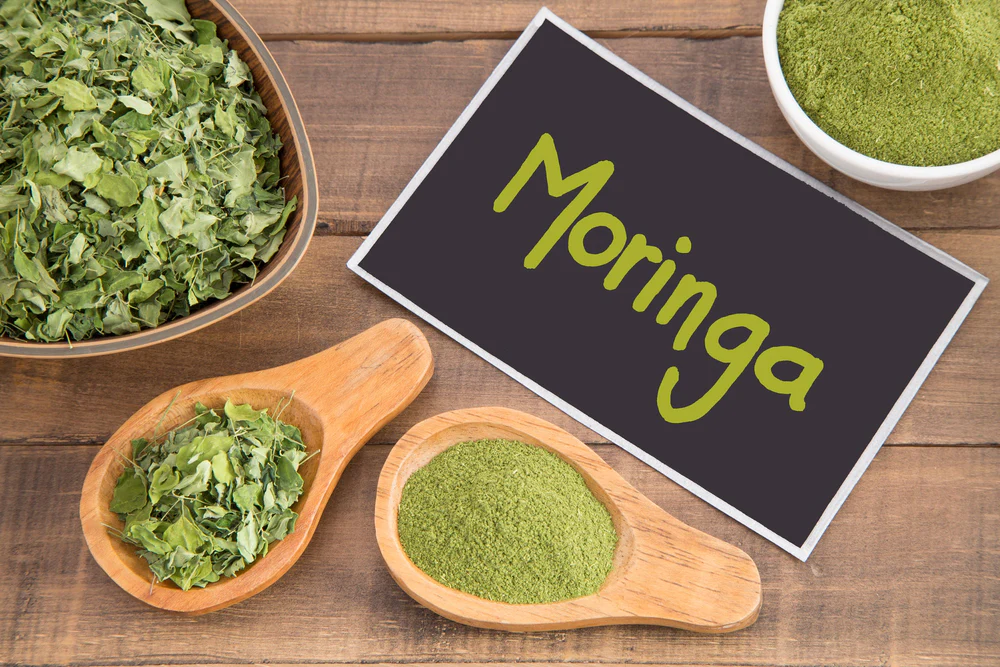
Organic Vs. Conventional Moringa Powder
Cultivation Practices
The primary difference between organic and conventional moringa powder lies in the cultivation practices. Organic moringa is grown without the use of synthetic pesticides, herbicides, and fertilizers. Instead, organic farming relies on natural substances and physical, mechanical, or biologically based farming methods to the fullest extent possible.
Conventional moringa, on the other hand, is often cultivated using synthetic chemicals to fend off pests and diseases and to promote growth. These chemicals can leach into the soil and water, potentially harming the environment and reducing biodiversity.
Nutritional Content and Safety
Organic moringa powder is often perceived to be more nutritious and safer than its conventional counterpart. The absence of harmful pesticides and fertilizers in organic farming means the moringa leaves are less likely to contain residues of these chemicals, which can be harmful to human health over time.
While both organic and conventional moringa powders contain essential vitamins, minerals, and antioxidants, the nutrient content can be slightly higher in organic produce due to the healthier, more natural soil in which they are grown. This soil contributes to a more robust plant with a higher nutritional profile.
Environmental Impact
Organic farming practices are designed to be more sustainable and environmentally friendly than conventional farming methods. By avoiding synthetic chemicals, organic moringa farming helps preserve water quality, enhance soil fertility, reduce pollution, and support biodiversity. Conventional farming, with its reliance on chemical inputs, can lead to soil degradation, water contamination, and harm to wildlife.
Cost and Availability
Organic moringa powder is typically more expensive than conventional options. This price difference is due to the higher costs associated with organic farming practices, such as labor-intensive weed control and the use of organic fertilizers and pesticides. Moreover, organic certification costs and lower yields also contribute to the higher price point.
Despite the cost, the availability of organic moringa powder has increased significantly, thanks to growing consumer demand for organic products. Many health food stores, online retailers, and specialty shops now offer organic moringa powder, making it more accessible to those looking to incorporate this superfood into their diets.
Taste and Quality
Some users report a difference in taste and quality between organic and conventional moringa powder, with organic moringa often described as having a fresher, cleaner taste. This difference could be attributed to the absence of chemical residues in organic moringa, which can affect the flavor and overall quality of the powder.
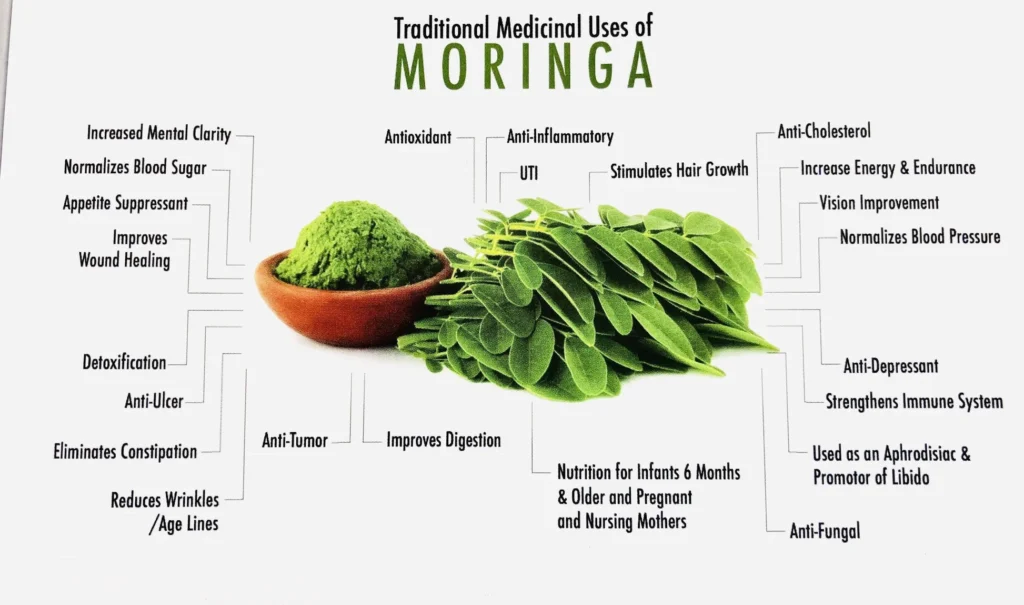
How to Use Organic Moringa Powder
1. Start with Smoothies
One of the easiest and most popular ways to use moringa powder is by adding it to smoothies. Its mild, earthy flavor blends well with fruits and vegetables, making it a perfect nutrient boost for your morning or post-workout smoothie. Simply add a teaspoon of moringa powder to your favorite smoothie recipe for an extra dose of vitamins, minerals, and antioxidants.
2. Enhance Your Breakfast
Organic moringa powder can easily be incorporated into breakfast foods. Sprinkle it over oatmeal, yogurt, or cereal to start your day with a nutrient-rich meal. You can also add moringa powder to pancake or waffle batter for a healthy twist on traditional breakfast favorites.
3. Boost Soups and Salads
Moringa powder can be mixed into soups and stews or sprinkled on top of salads. Its high nutrient content makes it a great addition to meals, enhancing not only the nutritional value but also adding a subtle flavor that complements a variety of dishes.
4. Bake with It
Incorporate moringa powder into your baking by adding it to bread, muffins, or cookies. This not only boosts the nutritional profile of your baked goods but also gives them a unique color and a hint of earthiness that pairs well with other ingredients.
5. Create Energizing Teas
Moringa powder can be used to make a nutritious tea. Simply add a teaspoon of moringa powder to hot water, and let it steep for a few minutes. You can add honey, lemon, or ginger for extra flavor. This tea is a great way to enjoy the benefits of moringa, especially if you’re looking for a caffeine-free energy boost.
6. Use It as a Seasoning
Moringa powder can serve as a seasoning for meats, fish, and vegetables. Its subtle flavor enhances dishes without overpowering them. It’s an easy way to incorporate more nutrients into your meals, especially if you’re trying to eat more healthily.
7. Add to Energy Bars and Snacks
For a quick and nutritious snack, add moringa powder to homemade energy bars, balls, or granola. Its high protein content makes it an excellent addition to snacks, helping you stay full and energized throughout the day.
Tips for Using Moringa Powder
- Start Small: If you’re new to moringa, start with a small amount and gradually increase it to avoid any digestive discomfort.
- Quality Matters: Choose high-quality, organic moringa powder to ensure you’re getting the most benefits without any contaminants.
- Store Properly: Keep your moringa powder in a cool, dry place away from direct sunlight to maintain its potency.
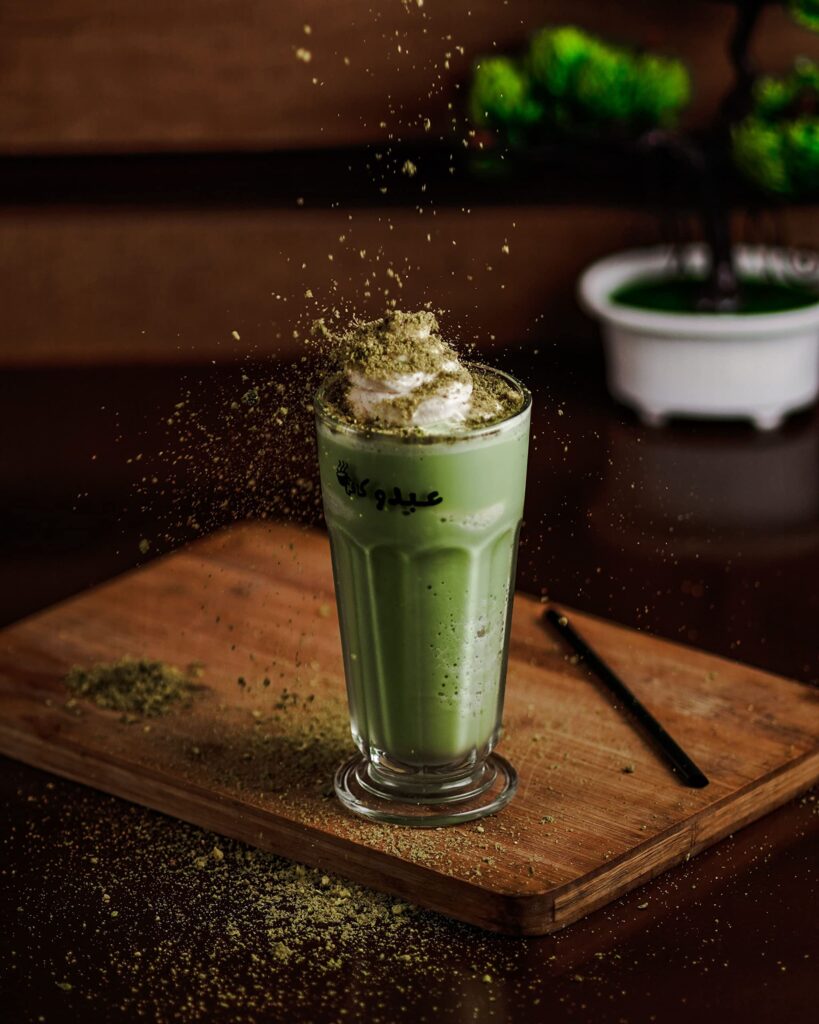
The Environmental Impact of Organic Farming
1. Reduced Pollution and Greenhouse Gases
Organic farming practices significantly reduce the reliance on chemical inputs such as synthetic fertilizers and pesticides. These chemicals are major sources of water and air pollution, contributing to greenhouse gas emissions through their production and application. Organic farming, by avoiding these chemicals, minimizes its impact on water and air quality, leading to less pollution and lower greenhouse gas emissions.
2. Enhanced Soil Health
Organic farming places a strong emphasis on maintaining and improving soil health through natural means. Practices such as crop rotation, the use of organic fertilizers like compost and manure, and reduced tillage help to build soil organic matter. This not only enhances the soil’s ability to retain water and nutrients, thereby reducing the need for irrigation and fertilization but also sequesters carbon, which helps to mitigate climate change.
3. Water Conservation and Quality
Organic farms tend to use water more efficiently and are more likely to implement conservation practices compared to conventional farms. By improving soil structure and water retention, organic farming reduces soil erosion and runoff, which in turn protects water sources from pollution by agricultural inputs. This leads to improved water quality and availability in agricultural areas.
4. Biodiversity Preservation
Organic farming supports biodiversity at multiple levels, from the soil microbiome to the farm landscape. By avoiding synthetic chemicals and using practices that encourage ecological balance, organic farms provide a safer habitat for wildlife, including pollinators, beneficial insects, and birds. Crop diversity, another hallmark of organic farming, further contributes to the conservation of species by maintaining genetic diversity in the agricultural ecosystem.
5. Reduced Energy Consumption
The production and use of synthetic fertilizers and pesticides are energy-intensive processes. By eliminating these inputs, organic farming generally uses less energy. Moreover, organic practices such as hand weeding, green manures, and cover cropping are less reliant on non-renewable energy sources, further reducing the carbon footprint of agriculture.
6. Encouragement of Sustainable Practices
Organic farming is part of a broader movement towards sustainable agriculture, which seeks to produce food in a way that can be sustained over the long term without depleting resources or harming the environment. By demonstrating that it is possible to produce food efficiently and profitably without causing ecological harm, organic farming encourages the adoption of sustainable practices across the agricultural sector.
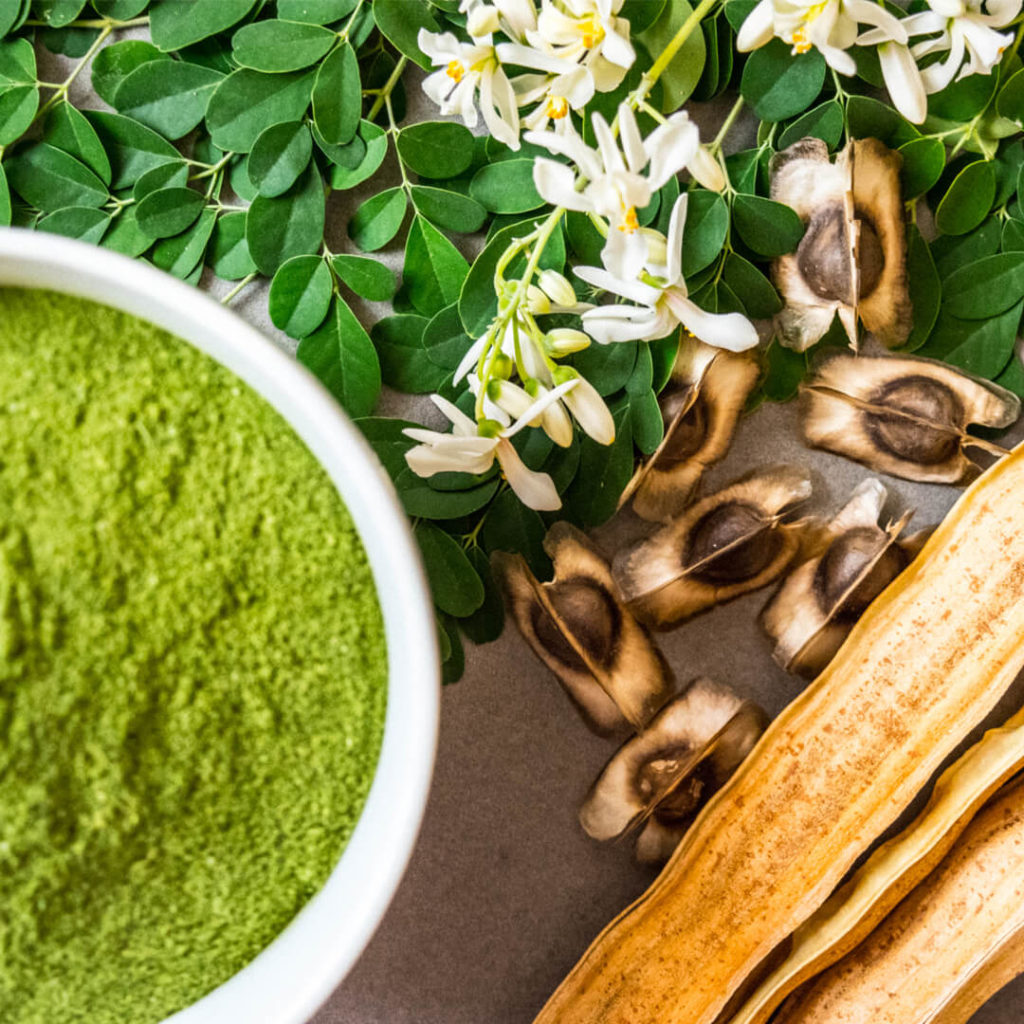
Choosing the Right Organic Moringa Powder
1. Certification and Organic Standards
The first and most crucial factor to consider is whether the Moringa powder is genuinely organic. Look for certifications from reputable organizations such as the USDA (United States Department of Agriculture) or EU Organic certification. These certifications ensure that the product meets strict standards for organic farming, including no use of synthetic pesticides, fertilizers, or genetically modified organisms (GMOs).
2. Source of the Moringa
The quality of Moringa powder is heavily influenced by its source. Moringa grown in its native environment, under optimal conditions, is likely to have a higher nutrient profile. Products that specify the country or region of origin offer transparency and assurance of quality. Countries known for high-quality Moringa include India, Africa, and certain parts of Asia.
3. Processing Methods
The method used to process Moringa leaves into powder significantly affects its nutritional content. Opt for Moringa powder that is cold-pressed or shade-dried, as these methods preserve the most nutrients. High temperatures and excessive processing can degrade vital compounds, so it’s essential to choose a product that retains the integrity of the raw Moringa leaves.
4. Purity and Ingredients
Check the ingredient list to ensure that the product contains 100% Moringa leaf powder, with no fillers, additives, or preservatives. Some products may include other ingredients that dilute the purity and effectiveness of the Moringa powder. A pure, single-ingredient product guarantees that you’re getting all the benefits of Moringa without unnecessary additives.
5. Packaging and Storage
The packaging of Moringa powder can affect its shelf life and potency. Look for packaging that protects the powder from light, air, and moisture, such as resealable bags or containers. Proper packaging ensures that the Moringa powder retains its nutritional value and freshness over time.
6. Brand Reputation and Reviews
Research the brand’s reputation and read customer reviews to gauge the quality of their Moringa powder. Brands with a commitment to quality, transparency, and ethical sourcing are more likely to offer high-quality products. Customer reviews can provide insight into the product’s effectiveness, taste, and overall satisfaction.
7. Price and Value
While price shouldn’t be the sole factor in your decision, it’s important to consider the value you’re getting. Compare prices among reputable brands, but be wary of products that are significantly cheaper than the competition, as this may indicate lower quality or purity.
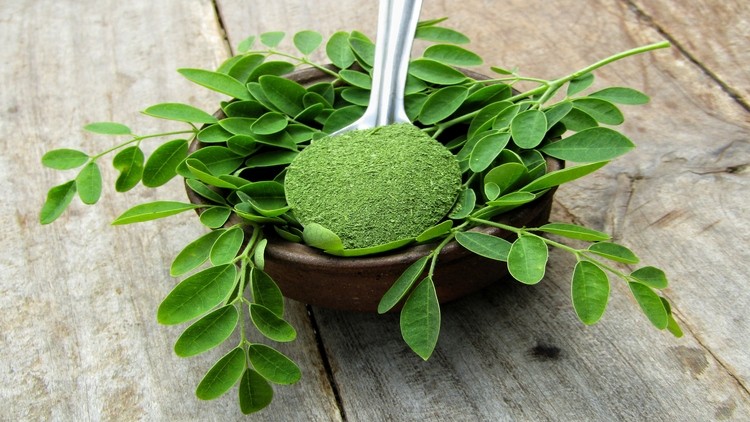
FAQs About Organic Moringa Powder
1. What is organic Moringa powder made from?
Organic Moringa powder is made from the dried leaves of the Moringa Oleifera tree. The leaves are harvested, cleaned, and then dried at low temperatures to preserve their nutritional value, before being ground into a fine powder.
2. Why choose organic Moringa powder over non-organic?
Choosing organic Moringa powder ensures that the product is free from synthetic pesticides and fertilizers, genetically modified organisms (GMOs), and other chemicals. Organic farming practices also promote environmental sustainability and biodiversity.
3. How can I incorporate organic Moringa powder into my diet?
Organic Moringa powder is highly versatile and can be added to smoothies, juices, teas, and soups, or sprinkled over salads and dishes. It can also be used as an ingredient in baking to enrich the nutritional content of breads, muffins, and other baked goods.
4. What are the key health benefits of organic Moringa powder?
Organic Moringa powder is rich in vitamins, minerals, antioxidants, and amino acids. It supports immune health, boosts energy levels, aids in weight management, improves skin health, and contributes to overall well-being.
5. Are there any side effects of consuming organic Moringa powder?
Organic Moringa powder is generally safe for consumption. However, due to its high vitamin and mineral content, it should be consumed in moderation. People on medication or with health conditions should consult with a healthcare provider before adding it to their diet.
6. How does organic Moringa powder support environmental sustainability?
Organic farming of Moringa supports soil health, reduces pollution from chemical inputs, conserves water, and promotes biodiversity. Choosing organic products like Moringa powder encourages sustainable agricultural practices.
7. Can pregnant or nursing women consume organic Moringa powder?
Pregnant and nursing women should consult with a healthcare provider before adding Moringa powder to their diet. While Moringa leaves are nutritious, their safety during pregnancy and lactation has not been extensively studied.
8. How should I store organic Moringa powder?
To preserve its freshness and nutritional quality, store organic Moringa powder in a cool, dry place away from direct sunlight. Ensure the container is airtight to prevent moisture from affecting the powder.
9. How long does organic Moringa powder last?
When stored properly, organic Moringa powder can last up to two years. However, it’s best to check the expiration date on the package and consume it within that timeframe for optimal freshness and efficacy.
10. Is organic Moringa powder suitable for everyone?
While organic Moringa powder is beneficial for most people, individuals with specific health conditions or those taking certain medications should consult with a healthcare provider to ensure it is appropriate for their diet.
Conclusion
Incorporating organic moringa powder into your daily regimen could be the game-changer you’ve been looking for. Its unparalleled nutritional profile and health benefits make it a must-have for those seeking to enhance their overall well-being and achieve life’s balance.
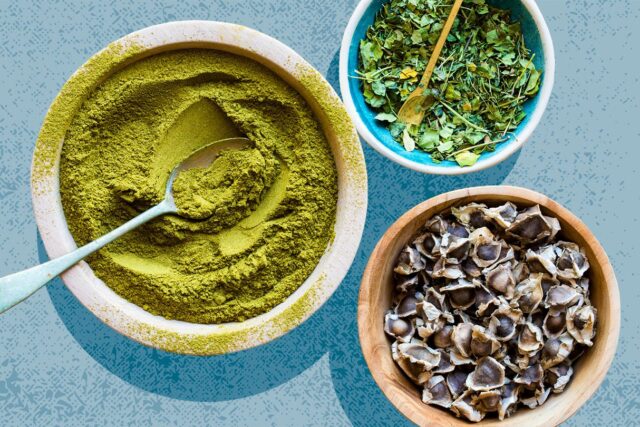
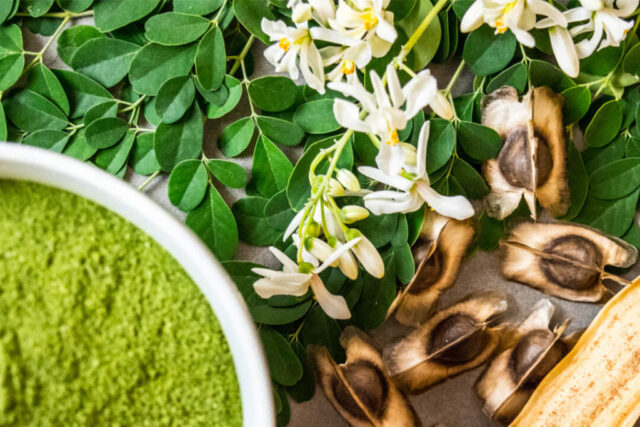

MOST COMMENTED
Animal-Based Proteins / Casein Protein / Dietary Protein / High-Protein Diets / Pea Protein / Plant-Based Proteins / Protein / Protein Deficiency / Protein Supplements / Proteins / Whey Protein / Whey Proteins
Is Protein Powder Safe for Teenagers and Children?
Animal-Based Proteins / Casein Protein / Dietary Protein / High-Protein Diets / Pea Protein / Plant-Based Proteins / Protein / Protein Deficiency / Protein Supplements / Proteins / Whey Protein / Whey Proteins
Unlock the Power of Proteins for Optimal Gut Health
Multivitamin
Total Health: Multivitamin for Active Lifestyles
Multivitamin
WellnessFusion: Complete Multivitamin Support
Dietary Supplement
Revitalize Your Health: The Magic of Red Yeast Rice Capsules
Foot care / Foot Health
Revitalize Your Foot Care Routine: Essential Tips for Optimal Foot Health
Foot Problem / Diabetics / Foot Health
Diabetics: Mastering Footwear Selection for Enhanced Foot Health and Ultimate Comfort
Exercises and Footwear Tips for Hammertoe Relief / Foot care / Foot Health / Foot Pain / Foot Problem / Hammertoes
Unlock Effective Exercises and Footwear Tips for Hammertoe Relief
Hammertoes / Foot Health / Foot Pain / Foot Problem
Unlock Relief: Essential Guide to Hammertoes Causes, Symptoms, and Treatments
Foot Problem / Foot Health
Revolutionize Your Recovery: Natural Remedies for Plantar Fasciitis – Fresh Home Keepers